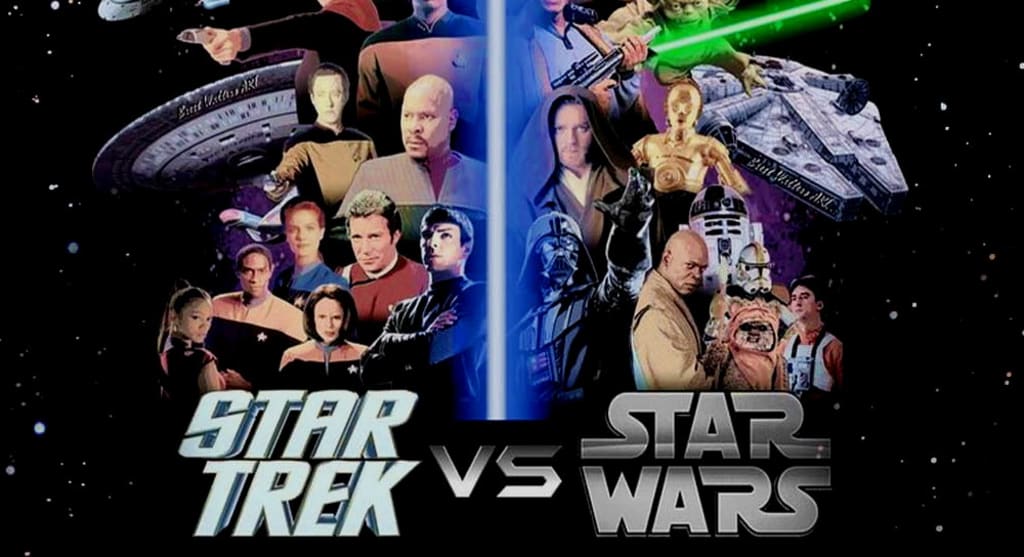Star Wars vs. Star Trek
A mismatch made in heaven

I am here to negotiate a peace treaty with Star Wars fans.
Ours is a conflict that never should have begun — at least not for the reasons civilians lump us together.
Our respective franchises share about as much in common as apples do with oranges. Sure, both take place in space and both make use of cool costumes for their actors and astonishing special effects.
That’s about it.
While superficially they seem to belong to the same genre, the true spirit of the two franchises reside in opposite arenas entirely. Perhaps this is the substance of the battle all these years.
Star Trek represents science and Star Wars represents religion. Star Trek is inspired by philosophy while Star Wars is inspired by mythology and Joseph Campbell’s assessment of the hero’s journey. Star Trek deals with great scientific discoveries humanity might someday uncover if we learn to work together while the heart of Star Wars is a seemingly divine Force that resides in a galaxy far, far away from any human.
For the sake of cultivating good will in our quest for peace, I will admit the many violations of this separation perpetrated by unworthy Star Trek writers after Gene Roddenberry died. The Star Wars impersonations they attempt vex me more deeply than you, my friends.
When Star Trek: Voyager episode 1 opened with a word scroll over the backdrop of outer space, I involuntarily clenched my fists and cried out, “Khan!”. It was the end of my relationship with Voyager.
The young George Lucas was apparently taken with mythology. He studied mythology and mapped out the story of Star Wars based on those structures. This affinity for myth can even be seen in the Indiana Jones films, where the title character seeks out mythical artifacts and repeatedly discovers that his academic skepticism was misguided as these relics turn out to really possess supernatural powers.
Adding a heaping scoop of religion into a Lucas project is what his fans came to expect. When he changed course, they punished him. When he tried to inject the smallest bit of science into the mythological galaxy of Star Wars by creating the term “midi-chlorians” to explain the Force, fans were outraged. When he decided the relic Indiana Jones should pursue was one that came from outer space instead of being powered by the divine, the fourth film was declared an abomination.
In my estimation, young Lucas was interested in telling a fun and exciting story that would live for decades in the imaginations of fans, and realized that using the already paved religious roads into his audience’s heart was a multi-billion dollar idea.
Gene Roddenberry, on the other hand, was looking to craft some vehicle to carry his ideas about philosophy and the development of the human race to viewers. That vehicle became Star Trek.
Roddenberry’s ideas, in my opinion, were fully formed by the time he created Star Trek: The Next Generation. Though writers on his staff were frequently frustrated by his high-minded and aspirational vision for the series, preferring instead to use easier recipes for building stories, the core of it dealt with the magnificent things humanity might accomplish if we set aside our foibles and cooperate as a single race.
Roddenberry described humanity’s development as being similar to a single human’s development. In our race’s toddler years we banged sticks against rocks. During our childhood we were ignorant and mischievous and believed in magic and divinity. He argued that we are currently in our warring adolescence, but would someday reach maturity and manage such grand accomplishments that they can only be imagined today in a genre called science fiction.
Let there be peace between our people.
It is time that we put an end to the assumptions of uneducated plebeians who lump us together while knowing little about either franchise. Star Wars fans can fully enjoy their ventures into an imagined past of some far away galaxy and we Star Trek fans can savor the hoped-for future Roddenberry expected for humanity.
And, if we should cross paths at the movie theater or comic book store, I will happily compliment your plastic lightsaber, trusting that you will respond kindly with regard to my rubber Vulcan ears.
Live long and prosper, Star Wars fans.
About the Creator
Otis Adams
Otis Adams is an essayist, fiction writer, and poet. He enjoys and writes about chess, boxing, and television history.
Please consider supporting Otis's work at Patreon.com/OtisAdams.






Comments
There are no comments for this story
Be the first to respond and start the conversation.